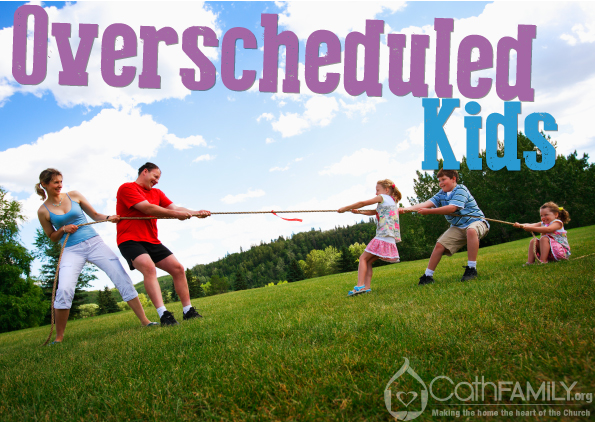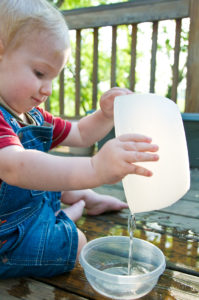Overscheduled Kids

In a fast-paced culture driven by the need to have it all, many kids are growing up without the joy of authentic leisure.
In a telling exposé of modern family life, author and family therapist Bill Doherty is sounding the alarm about our children’s extra-curricular activities.
In a world where parents are driven to provide their children with a competitive advantage over their peers, the after-school activities are multiplying out of control.
He describes parents as “activity coordinators on the good cruise ship called ‘family’” who spend inordinate time driving, watching, cheering, coaching and working to pay for their children’s multiplying activities.
But his concern is not primarily with the parents, but with the harm done to children who, in the frantic rush to and from activities are denied the opportunity to enjoy the rich tapestry of family interaction that occurs over family meals and unstructured play time.
In our haste to give our children every opportunity to explore their many talents, we often overlook the simple joys and fundamentally important investment in family relationship time.
Bill Doughty’s book, ‘Take Back Your Kids’ explores the harm done to children who are ‘overscheduled’. He outlines how excessive extra-curricular activities costs the whole family so that family time gets the ‘dregs’ and the parent’s relationship gets the ‘dregs of the dregs’. Childhood has been hijacked by organised activities that reinforce the ‘child-centric’ family mentality, teaching kids that their needs and wants are more important than the needs of the family unit. Is it any wonder that psychologists are now talking about a substantial increase in narcissism (a disabling ‘me’ centred attitude) among college students?
 A Current Affairs story reported on the activities of one family on one day of the week where both children were ferried to multiple activities. Each family member ate separately in between the various scheduled hobbies while parents drove children to and fro. One child was unable to complete homework until 9pm before falling into bed exhausted. In a typical week, this family had music, martial arts, several sports and dance activities, many of which required both training and a competitive game.
A Current Affairs story reported on the activities of one family on one day of the week where both children were ferried to multiple activities. Each family member ate separately in between the various scheduled hobbies while parents drove children to and fro. One child was unable to complete homework until 9pm before falling into bed exhausted. In a typical week, this family had music, martial arts, several sports and dance activities, many of which required both training and a competitive game.
Does this sound like your family?
It certainly sounds like ours at times. It’s easy for us as parents to feel compelled to give our children the opportunity to develop talents and interests – there is considerable social pressure to match the parental investment of our peers, not to mention the pester-power of our children’s insistent begging. Yet, more organised activities are not always in the best, long term interests of our children’s development.
Unstructured Play
One of the biggest casualties of the ‘overscheduled kids’ phenomenon is the loss of unstructured play. When kids are left to create their own entertainment, a number of important things happen:
- They seek the company of siblings and neighbours which helps them to develop their social skills and leads them to appreciate that they are part of a family, a neighbourhood, a village.
- They learn how to resolve disputes and negotiate rules for fair play.
- They learn how to interact with kids of various ages, abilities and interests.
- They craft new games and invent new scenarios for role playing.
- They get more outdoor time and creative play time to build their imagination (compared to more solitary electronic time).
Structured activities have a place and can be a great way for a child to learn a new skill, make new friends, feel part of a team and experience competitive play.
However, if there are too many structured activities, kids simply don’t have the time or energy for spontaneous neighbourhood ball games or imaginative play.
Instead, they learn to rely on adults to provide their entertainment and can absorb the attitude that the community ‘owes’ them entertainment and support in pursuing their interests.
This sets them up for a self-centred, narcissistic mentality which will hinder them in forming healthy relationships of mutual respect.
Re-Thinking Boredom
It seems like boredom is a cardinal sin in family life these days. Should a child complain of boredom, many parents spring to action in a frantic rush to relieve this perfectly healthy and valuable emotion.
Boredom is the crucible of the imagination; it creates the ‘space’ in a busy mind for creativity to be explored and expressed.
Yet for many parents, their child’s boredom is taken as a judgement on their failure to provide sufficient stimulation for their child. Through all the good will in the world, they try to distract the child from the creative process by seeding it with ideas or in-filling it with activity. In truth, a parent’s unwillingness to let a child endure boredom ultimately robs that child of an opportunity to let their creativity emerge and to learn how to self-manage their emotions and mental needs.
Another Child?
For the parents trapped by the demands of ‘overscheduled children’, the possibility of having another child is met with horror – how could we possibly manage another child when we already have all our spare time occupied, let alone afford it? They come to view their children (and any possible future children) as burdensome and understandably so. Sadly, many opt to deny their children of the joy of another sibling, valuing the many activities over the gift of another family member.
Faith Sidelined
Of course, one of the most obvious casualties of the overscheduled generation is the decline in practice of their faith. When “Little Nippers” or “Sunday Soccer” takes priority over Mass and engagement with the faith community, children learn that their faith is not essential to their wellbeing.
Moreover, without a solid and regular exposure to the faith community and to the Mass, they can feel like strangers when they do go, and the Mass often seems boring because they have not been given the opportunity to understand it or develop a love for its rituals.
Hence parishes and parents come under increasing pressure to make Mass more ‘entertaining’ not just for children but for young adults who have been raised in the overscheduled environment.
Boredom Busters
Here’s some ideas to help you get your kids off the scheduled activities and into some unstructured play.
 Pre-schoolers:
Pre-schoolers:
- Soapy-sudsy sink. Fill up with kitchen sink with suds and get them experimenting with water in different containers. Then transition them to productive washing. They’ll feel important if you can trust them to wash some of your dishes and pots.
- Play Dough. It’s cheap enough to buy and even cheaper to make AND your kids will enjoy the ‘cooking’. Recipe here
- Grain Time. Set the kids up with a variety of grains (rice, lentils, sugar, flour, bread crumbs etc) in different containers. Provide them with some kitchen scales and a variety of cups, spoons, jars and bowls.
Primary Aged:
- Nature Hunt. Deal with the nature deficit disorder and get your kids hunting for a list of natural objects such as a feather, a flower, a twig in the shape of Y, a white stone, a piece of bark, a dead leaf etc.
- Blanket Cubbies. A great wet weather activity: let them build their own retreat with blankets, sheets and towels. For a special treat, roll out the sleeping bags and let them stay the night.
- Commerce. Monopoly is one way to teach our kids about commerce, but it’s even better to help them create their own little business venture. It might be a lemonade stand, sausage sizzle or homemade crafts…let them express their passion!
 Teens:
Teens:
- Cooking. Help them develop life-skills and taste the joy of serving others. There are lots of simple and tasty recipes that a novice cook can manage, such as caramel popcorn, sausage rolls, chocolate chip cookies and hamburgers.
- Freeform Blanket. Invest in some wool or collect the leftovers and teach your kids how to knit or crochet. Using the freeform method, they can create any shape or size they want in either knitting or crochet that can be joined together into an organic throw rug that grows with each addition. See some examples on our ‘Boredom Busters’ Pinterest Board.
- Deconstruction therapy. Don’t throw that old phone, printer or appliance away… let your teen take it apart to study how it works. And who knows, they may even work out how to fix it!
Time for Dinner
Research has demonstrated that one of the most valuable practices a family can adopt is regular meals together… without the TV! Family meals help kids develop good nutritional habits and also provide important social support where their daily triumphs and challenges can be shared.
In our family, we find that our teenagers and young adults (with their girl/boyfriends) will sit and chat for up to an hour after dinner, often bringing up significant issues like how to handle a friend who drinks too much or significant career decisions.
 What strikes us, is that these significant conversations need to be preceded by a more leisurely conversation; the deep content only emerges after everyone has slowed down and reconnected.
What strikes us, is that these significant conversations need to be preceded by a more leisurely conversation; the deep content only emerges after everyone has slowed down and reconnected.
It reinforces for us the importance of ‘quantity time’ – it’s just not possible to jump straight in to a ‘quality’ conversation without first having lots of low-intensity ‘quantity’ time.
This is reinforced by parenting expert Dr Justin Coulson who maintains that emotional availability is the most important thing a parent can give their child. (more: here)
Authors: Francine Pirola & Jessica Lubgans
Over to you: Do you think kids are overscheduled these days? How many activities do your kids do and have you had to limit them? Have you experienced parental peer pressure about your kid’s extra-curricular activities? Tell us in the comments below!

This article featured in the June 2013 edition of the CathFamily eMagazine. For more, check out:

